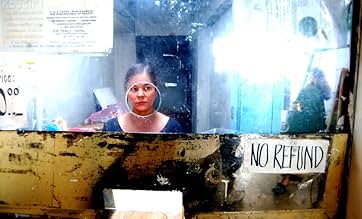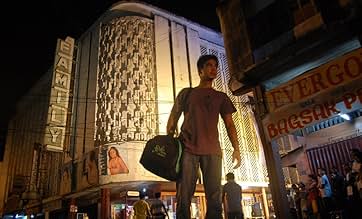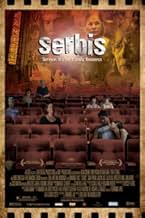IMDb रेटिंग
6.1/10
2 हज़ार
आपकी रेटिंग
अपनी भाषा में प्लॉट जोड़ेंThe Pineda family struggles with bigamy, unwanted pregnancy, possible incest, and skin irritations in a dilapidated movie theater.The Pineda family struggles with bigamy, unwanted pregnancy, possible incest, and skin irritations in a dilapidated movie theater.The Pineda family struggles with bigamy, unwanted pregnancy, possible incest, and skin irritations in a dilapidated movie theater.
- पुरस्कार
- 9 जीत और कुल 15 नामांकन
Kristoffer King
- Ronald
- (as Kristofer King)
Dido de la Paz
- Atty. Quintana
- (as Dido Dela Paz)
Buddy Caramat
- Tonette
- (as Buddy Salvador Caramat)
Aaron Rivera
- Ricky
- (as Aaron Christian Rivera)
फ़ीचर्ड समीक्षाएं
A dilapidated Filipino movie theater is the star of this film, but it's not a dark, haunted place like the cinema of Tsai Ming-liang's austere Goodbye, Dragon Inn. Located in the city of Angeles in the Philippines, this one, only partly ironically called "Family," is active, in fact overactive, and holes in walls leave it open to invasions from goats and its lower floor is exposed to the noises of a busy street crammed with pedestrians, motorcycles, cars, and trucks at all hours.
Serbis shows heterosexual porn movies all day long while numerous gay hustlers ply their trade for the pleasure of older gay men, performing fellatio or having it performed on them in the seats and in the back of the big auditorium. "Serbis" means "service" and is the rallying cry of the gay rent boys. The theater is run by the Pineda family, who come and go, they live upstairs, they run a fast food restaurant on the ground floor, and they deal with such personal problems as bigamy, unwanted pregnancy, possible incest, and a boil on an attractive young male bum. This film, which includes clips of the porno, live sex involving the family and the in-house prostitutes, is Mendoza's seventh feature film and was an official selection of the 2008 Festival de Cannes.
Events happen on a "Wednesday (the day for the novena to the Mother of Perpetual Help) in October (month-long feast of Our Lady of the Rosary)"--I'm quoting from the distributor's material. The rather regal Nanay Flor (Gina Pareno) has filed a bigamy case against her estranged husband Tatay Edwinand goes to court to see the years-long case finally decided. Alan (Coco Martin) is a young man upstairs who paints busty nudes on the wall; he's the one who has a boil on his bum. He has sex with his girlfriend Merly (Mercedes Cabral) and has just learned to his dismay that she is pregnant. Nayda (Jacky Jose), who mans the theater while Nanay For is at court, is married but drawn to her cousin Ronald, who is also in the building. She sees to having the right movie posters up, and argues with her husband, Lando, on the phone, because Mr. El Lobo, the soft drink distributor, has to be paid. Lando (Julio Diaz) mans the little restaurant, not always successfully; a young man cheats him out of 30 pesos and he can't get it back. There is another brother, Ronald (Kristopher King). There's also a little bespectacled schoolboy, Jonas, who's good in math. The things he sees! Nanay Flor says that they had three theaters, but have had to close the other two because they weren't making money, and this one is failing.
Nanay Flor loses the case, and to her disappointment her youngest son, Jerome (Dan Alvaro) testifies against her. She is further distressed to learn that the film rentals are going up. Serbis is replete with actual details of this kind, and even shows Alan delivering reels to a bus and picking up the new ones for the week.
Excitement happens when a purse-snatcher tries to take refuge in the theater but customers, the family, and cops all chase him. The lights go on exposing the many "serbis" boys 'in flagrante.' When the thief is caught the lights go down, the film resumes, and the "serbis" boys are back to work. At another point a small white goat has escaped into the theater and appears just below the screen. Another chase. To recover from her horrible day, Nanay Flor takes a bath in the shoddy bathroom (the Gent's is flooded), grooms herself and dresses in black, and goes down to the ticket window facing out, ready for anything.
After symbolically popping his boil, Alan has impulsively packed a bag and run away. way.
Carlo Tabije and Benjamin Padero deserve notice for their set designs (the field in which Mendoza got his start); Odyssey Flores' cinematography is rough at times, but effective. The processing gives the images too edgy a look at times. The lighting isn't bad, but there is way too much street noise, and those who argue the whole production is exploitive and crude aren't far off the mark, but the depiction of a family isn't without interest, though this has none of the poetry and mood of other films about the devolution of a place.
This is as if a Third World 'telenovela,' with X-rated sex added, was all crammed into a single comprehensive 90-minute episode. It's an impressive achievement, but a little bit indigestible. Mendoza's earlier film 'Foster Child' received an ovation at the previous Cannes festival. He has produced something sui generis this time and it would appear that there is life in the Filipino film industry.
Serbis shows heterosexual porn movies all day long while numerous gay hustlers ply their trade for the pleasure of older gay men, performing fellatio or having it performed on them in the seats and in the back of the big auditorium. "Serbis" means "service" and is the rallying cry of the gay rent boys. The theater is run by the Pineda family, who come and go, they live upstairs, they run a fast food restaurant on the ground floor, and they deal with such personal problems as bigamy, unwanted pregnancy, possible incest, and a boil on an attractive young male bum. This film, which includes clips of the porno, live sex involving the family and the in-house prostitutes, is Mendoza's seventh feature film and was an official selection of the 2008 Festival de Cannes.
Events happen on a "Wednesday (the day for the novena to the Mother of Perpetual Help) in October (month-long feast of Our Lady of the Rosary)"--I'm quoting from the distributor's material. The rather regal Nanay Flor (Gina Pareno) has filed a bigamy case against her estranged husband Tatay Edwinand goes to court to see the years-long case finally decided. Alan (Coco Martin) is a young man upstairs who paints busty nudes on the wall; he's the one who has a boil on his bum. He has sex with his girlfriend Merly (Mercedes Cabral) and has just learned to his dismay that she is pregnant. Nayda (Jacky Jose), who mans the theater while Nanay For is at court, is married but drawn to her cousin Ronald, who is also in the building. She sees to having the right movie posters up, and argues with her husband, Lando, on the phone, because Mr. El Lobo, the soft drink distributor, has to be paid. Lando (Julio Diaz) mans the little restaurant, not always successfully; a young man cheats him out of 30 pesos and he can't get it back. There is another brother, Ronald (Kristopher King). There's also a little bespectacled schoolboy, Jonas, who's good in math. The things he sees! Nanay Flor says that they had three theaters, but have had to close the other two because they weren't making money, and this one is failing.
Nanay Flor loses the case, and to her disappointment her youngest son, Jerome (Dan Alvaro) testifies against her. She is further distressed to learn that the film rentals are going up. Serbis is replete with actual details of this kind, and even shows Alan delivering reels to a bus and picking up the new ones for the week.
Excitement happens when a purse-snatcher tries to take refuge in the theater but customers, the family, and cops all chase him. The lights go on exposing the many "serbis" boys 'in flagrante.' When the thief is caught the lights go down, the film resumes, and the "serbis" boys are back to work. At another point a small white goat has escaped into the theater and appears just below the screen. Another chase. To recover from her horrible day, Nanay Flor takes a bath in the shoddy bathroom (the Gent's is flooded), grooms herself and dresses in black, and goes down to the ticket window facing out, ready for anything.
After symbolically popping his boil, Alan has impulsively packed a bag and run away. way.
Carlo Tabije and Benjamin Padero deserve notice for their set designs (the field in which Mendoza got his start); Odyssey Flores' cinematography is rough at times, but effective. The processing gives the images too edgy a look at times. The lighting isn't bad, but there is way too much street noise, and those who argue the whole production is exploitive and crude aren't far off the mark, but the depiction of a family isn't without interest, though this has none of the poetry and mood of other films about the devolution of a place.
This is as if a Third World 'telenovela,' with X-rated sex added, was all crammed into a single comprehensive 90-minute episode. It's an impressive achievement, but a little bit indigestible. Mendoza's earlier film 'Foster Child' received an ovation at the previous Cannes festival. He has produced something sui generis this time and it would appear that there is life in the Filipino film industry.
This is just the type of theater that one would expect to see certain politicians in the corner hiding from the press and their constituents. It is a seedy gay theater that shows heterosexual soft core porn films.
We go up and down the stairs of this theater as the family that runs it plays out their lives. Director Brillante Mendoza won a few awards, including a Golden Palm nomination.
Jacklyn Jose was very good as the daughter who keeps things going. She also has a very cute kid (Bobby Jerome Go). Gina Pareño won an Asian Film Award for her role as the matriarch who is trying to get rid of her philandering husband. Meanwhile, Alan's (Coco Martin) girlfriend (Mercedes Cabral) is pregnant, inspiring more drama and yelling. All of this occurs as they struggle to keep the last of three movie houses from going bankrupt.
The ending is pretty anticlimactic and I really didn't see it coming.
We go up and down the stairs of this theater as the family that runs it plays out their lives. Director Brillante Mendoza won a few awards, including a Golden Palm nomination.
Jacklyn Jose was very good as the daughter who keeps things going. She also has a very cute kid (Bobby Jerome Go). Gina Pareño won an Asian Film Award for her role as the matriarch who is trying to get rid of her philandering husband. Meanwhile, Alan's (Coco Martin) girlfriend (Mercedes Cabral) is pregnant, inspiring more drama and yelling. All of this occurs as they struggle to keep the last of three movie houses from going bankrupt.
The ending is pretty anticlimactic and I really didn't see it coming.
Even before watching our very own semi-controversial finalist in the Cannes de Festival this year, I knew that I would love Brillante Mendoza's "Serbis." Not only because two of my friends are in the production team, but this film strikes a familiar chord in my heart because I know personally the venue and the local color of the story where the story of the film takes place. I grew up in Pampanga and saw many films in majority of the theaters in Pampanga. During the lahar era, my sister and I stayed and lived in our photography studio, which was just beside San Fernando's best theater then. That time, I was inside that theater almost every day, watching the same film of the week again and again. If that does not conjure much bias for this film, maybe this one will: I personally experienced being almost sexually harassed in the Family Theater, the very same one featured in the film "Serbis." Now that's enough neo-realism for you. Hahaha!
I can understand why many people dislike "Serbis"--it's too raw, uninhibited, and bleak. Foreigners would be turned off by the disgusting display of sexual scenes and the popping of the boil from an actor's buttocks and the deafening and unrefined sound quality. And Filipinos would also be repulsed by the "lack of story" and the absence of subtitles while the actors freely converse in Kapampangan and Ilocano.
I am lucky enough to have an Ilocano beside me in the theater, translating the Ilocano dialogue. Of course, I was delighted to hear Kapampangan being spoken so lavishly and frequently in the entire course of the story. It felt so much like home to me. The sound and sight of Pampanga in the film are startlingly genuine. I shivered at the sight of familiar places. I marveled at the uncanny natural feel of the setting. The theater is alive.
We witness how the camera leads us to follow the main characters, as it snakes in and out of every room and shamelessly presents to us its ugliness and grittiness. The theater is a character itself--it has its own personality and even moral obligation to the psyche of every single character living or simply loitering in its premises. The members of the audience become part of the story as we spy on the characters' regrettable lives. The characters hang on to the theater as their refuge to the wretchedness of their own problems. We get to see a thin slice of their lives, from morning to night, which is more than enough to establish the story and make the audience draw out their own inferences as to how the story would, not end, but continue even after the credits start to roll.
That's probably what many viewers missed after seeing and dissing the movie with raised eyebrows and shoulders. The film managed to make them feel estranged because they are not familiar with such abnormalities or disgusted because the film does not apologize for its harsh depiction of the reality of "serbis" not only inside the film theater but also of the entire local film industry itself. It is quite apparent that the entire film is both homage to and critique on the Philippine cinema.
The most striking realization I had a few minutes after seeing the film is that despite the revolting scenes and appalling images bombarded to the audience in the majority of the screening time, there are also bits of images of optimism for the future of the characters and the theater itself: the walls are being repainted, the head of the family sits in front of the ticketing booth (suggesting taking more control of the cinema), and the troubled son starts his own journey to find himself even against the religious parade and the anonymous throng opposite his direction. In the words of Sam Cooke: A change is gonna come. I hope that Brillante's brilliant film will also be the impetus of such a thing in the Philippine cinematic history.
I can understand why many people dislike "Serbis"--it's too raw, uninhibited, and bleak. Foreigners would be turned off by the disgusting display of sexual scenes and the popping of the boil from an actor's buttocks and the deafening and unrefined sound quality. And Filipinos would also be repulsed by the "lack of story" and the absence of subtitles while the actors freely converse in Kapampangan and Ilocano.
I am lucky enough to have an Ilocano beside me in the theater, translating the Ilocano dialogue. Of course, I was delighted to hear Kapampangan being spoken so lavishly and frequently in the entire course of the story. It felt so much like home to me. The sound and sight of Pampanga in the film are startlingly genuine. I shivered at the sight of familiar places. I marveled at the uncanny natural feel of the setting. The theater is alive.
We witness how the camera leads us to follow the main characters, as it snakes in and out of every room and shamelessly presents to us its ugliness and grittiness. The theater is a character itself--it has its own personality and even moral obligation to the psyche of every single character living or simply loitering in its premises. The members of the audience become part of the story as we spy on the characters' regrettable lives. The characters hang on to the theater as their refuge to the wretchedness of their own problems. We get to see a thin slice of their lives, from morning to night, which is more than enough to establish the story and make the audience draw out their own inferences as to how the story would, not end, but continue even after the credits start to roll.
That's probably what many viewers missed after seeing and dissing the movie with raised eyebrows and shoulders. The film managed to make them feel estranged because they are not familiar with such abnormalities or disgusted because the film does not apologize for its harsh depiction of the reality of "serbis" not only inside the film theater but also of the entire local film industry itself. It is quite apparent that the entire film is both homage to and critique on the Philippine cinema.
The most striking realization I had a few minutes after seeing the film is that despite the revolting scenes and appalling images bombarded to the audience in the majority of the screening time, there are also bits of images of optimism for the future of the characters and the theater itself: the walls are being repainted, the head of the family sits in front of the ticketing booth (suggesting taking more control of the cinema), and the troubled son starts his own journey to find himself even against the religious parade and the anonymous throng opposite his direction. In the words of Sam Cooke: A change is gonna come. I hope that Brillante's brilliant film will also be the impetus of such a thing in the Philippine cinematic history.
This film challenges the actors to portray their characters realistically. The story revolves around them and there is no clear climax. Rather, it is a cacophony of events plotting the life of this family living in a run-down theater. They are barely subsistent.
I have a sense of having watched a play because the entire scene takes place in the theater. Camera techniques and lighting has been well placed that it draws the emotion and atmosphere accurately. The use of hand held technique and the background noise gives emphasis to the chaos and discordant lives that is.
Being a low-budget independent film, demonstrates to us that a good movie can be achieved and interpreted such as "SERBIS".
I have a sense of having watched a play because the entire scene takes place in the theater. Camera techniques and lighting has been well placed that it draws the emotion and atmosphere accurately. The use of hand held technique and the background noise gives emphasis to the chaos and discordant lives that is.
Being a low-budget independent film, demonstrates to us that a good movie can be achieved and interpreted such as "SERBIS".
I watched this movie with my filipino wife, she knew a many actors from there. I like the older pinoy movies, however they are mostly depressive and about hard life, but probably since this is not so old movie, it was not so dark. With a little filipinou humour style, i liked it.
क्या आपको पता है
- ट्रिवियाDirector Brillante Mendoza revealed that the sex scene between Coco Martin and Mercedes Cabral was simulated. "It was assumed by everyone that in the sex scene there was real penetration. The actors knew how I work, and if they were on a different level of their profession, they probably would have had real sex. But since this was the girl's first film and she's from a conservative family, she had done enough, so there is no penetration. But I wanted people to believe there was actual sexual intercourse, and it was so realistic that people believe that's what happened," he explained.
- भाव
Nanay Flor: How could you let this idiot impregnate you?
- कनेक्शनFeatured in दुनिया भर से लोगो: Philippines (2016)
टॉप पसंद
रेटिंग देने के लिए साइन-इन करें और वैयक्तिकृत सुझावों के लिए वॉचलिस्ट करें
- How long is Service?Alexa द्वारा संचालित
विवरण
- रिलीज़ की तारीख़
- कंट्री ऑफ़ ओरिजिन
- आधिकारिक साइट
- भाषाएं
- इस रूप में भी जाना जाता है
- Service
- फ़िल्माने की जगहें
- उत्पादन कंपनियां
- IMDbPro पर और कंपनी क्रेडिट देखें
बॉक्स ऑफ़िस
- US और कनाडा में सकल
- $64,536
- US और कनाडा में पहले सप्ताह में कुल कमाई
- $12,824
- 1 फ़र॰ 2009
- दुनिया भर में सकल
- $1,55,156
इस पेज में योगदान दें
किसी बदलाव का सुझाव दें या अनुपलब्ध कॉन्टेंट जोड़ें































